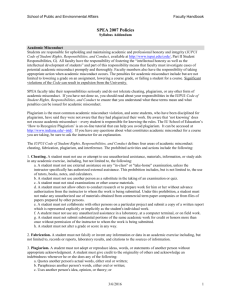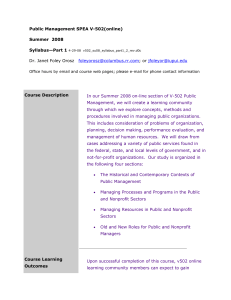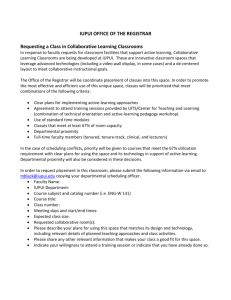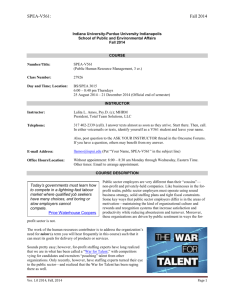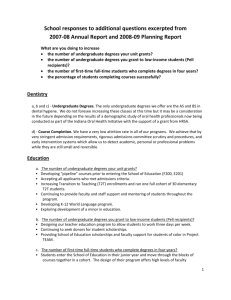Indiana University-Purdue University at Indianapolis
advertisement
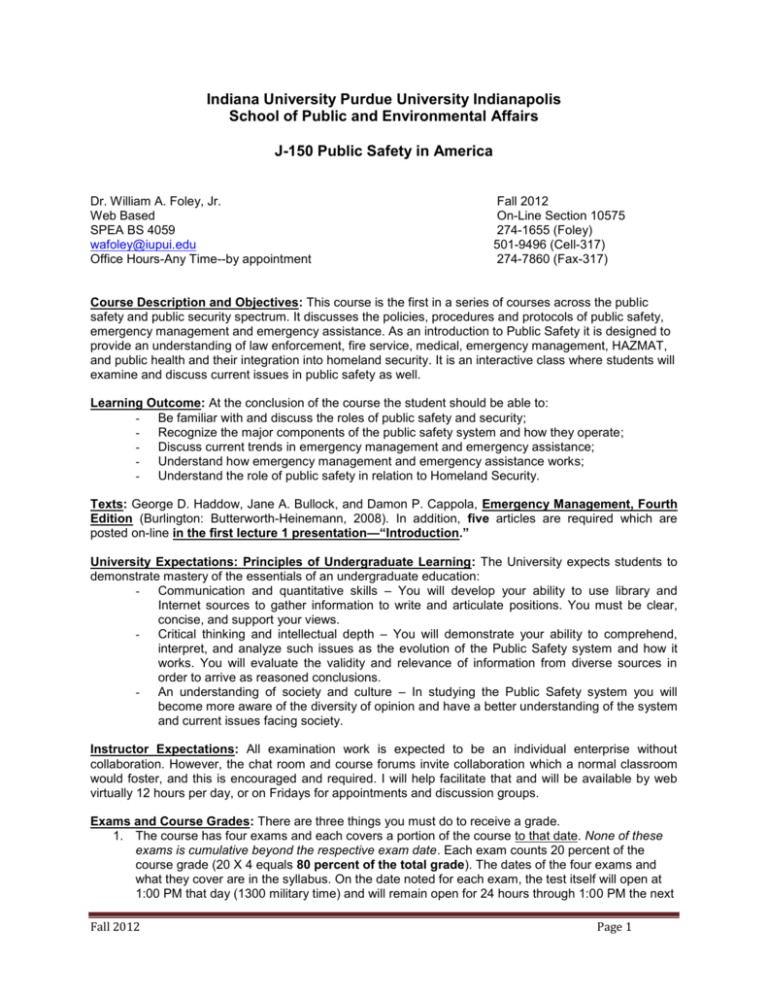
Indiana University Purdue University Indianapolis School of Public and Environmental Affairs J-150 Public Safety in America Dr. William A. Foley, Jr. Web Based SPEA BS 4059 wafoley@iupui.edu Office Hours-Any Time--by appointment Fall 2012 On-Line Section 10575 274-1655 (Foley) 501-9496 (Cell-317) 274-7860 (Fax-317) Course Description and Objectives: This course is the first in a series of courses across the public safety and public security spectrum. It discusses the policies, procedures and protocols of public safety, emergency management and emergency assistance. As an introduction to Public Safety it is designed to provide an understanding of law enforcement, fire service, medical, emergency management, HAZMAT, and public health and their integration into homeland security. It is an interactive class where students will examine and discuss current issues in public safety as well. Learning Outcome: At the conclusion of the course the student should be able to: - Be familiar with and discuss the roles of public safety and security; - Recognize the major components of the public safety system and how they operate; - Discuss current trends in emergency management and emergency assistance; - Understand how emergency management and emergency assistance works; - Understand the role of public safety in relation to Homeland Security. Texts: George D. Haddow, Jane A. Bullock, and Damon P. Cappola, Emergency Management, Fourth Edition (Burlington: Butterworth-Heinemann, 2008). In addition, five articles are required which are posted on-line in the first lecture 1 presentation—“Introduction.” University Expectations: Principles of Undergraduate Learning: The University expects students to demonstrate mastery of the essentials of an undergraduate education: - Communication and quantitative skills – You will develop your ability to use library and Internet sources to gather information to write and articulate positions. You must be clear, concise, and support your views. - Critical thinking and intellectual depth – You will demonstrate your ability to comprehend, interpret, and analyze such issues as the evolution of the Public Safety system and how it works. You will evaluate the validity and relevance of information from diverse sources in order to arrive as reasoned conclusions. - An understanding of society and culture – In studying the Public Safety system you will become more aware of the diversity of opinion and have a better understanding of the system and current issues facing society. Instructor Expectations: All examination work is expected to be an individual enterprise without collaboration. However, the chat room and course forums invite collaboration which a normal classroom would foster, and this is encouraged and required. I will help facilitate that and will be available by web virtually 12 hours per day, or on Fridays for appointments and discussion groups. Exams and Course Grades: There are three things you must do to receive a grade. 1. The course has four exams and each covers a portion of the course to that date. None of these exams is cumulative beyond the respective exam date. Each exam counts 20 percent of the course grade (20 X 4 equals 80 percent of the total grade). The dates of the four exams and what they cover are in the syllabus. On the date noted for each exam, the test itself will open at 1:00 PM that day (1300 military time) and will remain open for 24 hours through 1:00 PM the next Fall 2012 Page 1 day (1300). Within that period, you will have 75 minutes (one hour and fifteen minutes) to take the test from the time you open it, then it auto-submits. 2. In addition each student is expected to enroll and complete two (2) certificates, one a short Incident Command System Course (ICS) and the other a brief National Incident Management System Course (NIMS). Each takes about 3 hours of real time and both are with the Department of Homeland Security’s (DHS) Federal Emergency Management Agency (FEMA). They are entitled ICS 100a and NIMS 700a. Links are located at the Home Page for this course. You will receive a certificate of completion from the Department of Homeland Security for each course and credit with the Federal government which can be used for job placement later. To verify your work here, please email to me a copy of each respective certificate, OR a copy of the appropriate letter stating you finished each one, OR a copy of the final exam notice stating you passed each one. Subsequently your completion will be entered into the Grade Book and each FEMA Certificate is worth 5 percent (10 percent total grade). You have to provide evidence of your completion of these by Wednesday December 12, 2012 by 6;00 P.M. 3. Weekly Forums are held sequentially in each of the academic weeks of the course and are a requirement. They remain open for one week, and then are locked. The sequence is that you have been broken into groups. You can find what group you are in by going the Roster, the Group membership, and then Group View. The Fall term lasts 16 weeks and there are 14 Forums. No forum is held during the Fall Break Week---Oct 15 and 16, and no forum is held during the Thanksgiving Break Week November 21, 22, and 23. For each Forum, on Monday of each week read the question and review any materials needed to answer it properly. By Wednesday, place your individual response in the Forum. Then among the six of you, choose one person to post a consensus per week for your respective group. On Friday, that consensus must be posted and the selected person posts the group answer by 5:00 PM each Friday in the Friday Final Answer. I will review the Forums daily and make some comments or just go to each Forum weekly and see where you are. But by Friday evening, I will review and post the correct Forum answer, either then or Saturday morning…and notify everyone. Groups will remain constant throughout the Fall. In total, Forum participation is equal to 10 percent of your overall grade. In the forum grading rubric, you get 6 % of the Forum grade if you participate in all of them and higher percentages up to 10 ---- for great discussions and the correct answers. Overall course grades will be based on 80 % Exams; 10% Certificates; 10% Forums---equaling 100 points. The University grading system found at: http://registrar.iupui.edu/gradecover.html is: Grade Minimum % A+ 100.0 A 95.0 A- 90.0 B+ 87.0 B 83.0 B- 80.0 C+ 77.0 Fall 2012 Page 2 Grade Minimum % C 73.0 C- 70.0 D+ 67.0 D 63.0 D- 60.0 F 59.0 (-) Reading Assignments: This on-line J 150 course follows the same sequence of reading assignments as if it were meeting on-campus twice weekly on Mondays and Wednesdays. It parallels the regular Fall J 150 resident classroom course. Lectures and examinations parallel this sequence also. The reading assignments for each week are noted in the course syllabus below. All readings are required and should be completed before the start of a lecture session. Again, the articles are found posted in Session 1, course introduction, in order. Course Outline: Date Subject Readings August 20 (M) “ “ “ “ “ “ “ “ “ “ “ “ September 17 (M) “ “ “ “ “ “ “ “ “ “ “ “ October 17 (W) “ “ “ “ “ “ “ “ “ “ “ “ “ “ November 12 (M) “ “ “ “ “ “ “ “ “ “ “ “ “ “ Fall 2012 1. Course Introduction ___________ 2. Safety and Law Enforcement First Article 3. Law Enforcement 4. Private Security 5. Fire Second Article 6. EMS 7. HAZMAT Chapter 1 FIRST EXAM FIRST EXAM 8. Leadership and Planning Third Article 9. National Guard 10. City/County Emergency Management 11. Tour/Discussion Marion County EOC 12. State Planning Chapter 6 13. FEMA and DHS Fourth Article SECOND EXAM SECOND EXAM 14. Katrina 15. & 16. Katrina and Emergency Management Chapter 3 17. Local Public Safety and Emergency Management 18. Risk Assessment 19. Mitigation and Tornadoes Chapter 4 and 5 20. Response and ICS Chapter 6 and 7 21. Recovery Floods Fifth Article THIRD EXAM THIRD EXAM 22. Recovery Earthquakes 23. Preparedness--Planning Chapter 8 24. Preparedness—School Safety 25. Communications Chapter 9 26. Terrorism Chapter10 27. Psychology of Terrorism Chapter 2 28. 9/11 Page 3 “ “ December 10 (M) 29 and 30. WMD Teams FOURTH EXAM FOURTH EXAM SPEA 2012 Policies Syllabus Addendum There are a number of campus-wide policies governing the conduct of courses at IUPUI. These can be found at http://registrar.iupui.edu/course_policies.html. Additional information for SPEA courses is below. Civility and Disorderly Conduct SPEA, which is a professional school, expects students to conduct themselves in a courteous and civil manner in interactions with professors and fellow students. This requires each person to be courteous, tolerant, and respectful during interactions with one another in all interactions, including face-to-face interactions, e-mail, and telephone conversations. Examples of discourteous behavior during class include reading the newspaper, working crossword puzzles, listening to headphones, talking or laughing with other, arriving late, using computers to surf the web, allowing cell phones to ring or sending text messages, or other non-class activities. The use of language, tone, or gestures that are inappropriate or offensive is also discourteous. These behaviors are not acceptable, and SPEA faculty and staff will address these problems as they arise either in class or on an individual basis. Disorderly conduct that interferes with teaching, research, administration, or other university or university-authorized activity will not be tolerated and will be reported immediately to the Office of the Dean of Students for disposition, which may result in disciplinary action, including possible suspension and/or expulsion from the university. Responsibilities and expectations of students and faculty can be found at http://registrar.iupui.edu/misconduct.html. Academic Misconduct Students are responsible for upholding and maintaining academic and professional honesty and integrity (IUPUI Code of Student Rights, Responsibilities, and Conduct, available at http://www.iupui.edu/code/, Part II Student Responsibilities, G). Plagiarism is the most common academic misconduct violation, and some students, who have been disciplined for plagiarism, have said they were not aware that they had plagiarized their work. Be aware that ‘not knowing’ does not excuse academic misconduct – every student is responsible for knowing the Fall 2012 Page 4 rules. The IU School of Education’s ‘How to Recognize Plagiarism’ is an on-line tutorial that can help you avoid plagiarism. It can be accessed at http://www.indiana.edu/~istd/. If you have any questions about what constitutes academic misconduct for a course, be sure to ask the instructor for an explanation. All faculty have the responsibility of fostering the “intellectual honesty as well as the intellectual development of students” and part of this responsibility means that faculty must investigate cases of potential academic misconduct promptly and thoroughly. Faculty members also have the responsibility of taking appropriate action when academic misconduct occurs. The penalties for academic misconduct include but are not limited to lowering a grade on an assignment, lowering a course grade, or failing a student for a course. Significant violations of the Code can result in expulsion from the University. SPEA faculty take their responsibilities seriously and do not tolerate cheating, plagiarism, or any other form of academic misconduct. If you have not done so, you should read about your responsibilities in the IUPUI Code of Student Rights, Responsibilities, and Conduct to ensure that you understand what these terms mean and what penalties can be issued for academic misconduct. The IUPUI Code of Student Rights, Responsibilities, and Conduct defines four areas of academic misconduct: cheating, fabrication, plagiarism, and interference. The prohibited activities and actions include the following: 1. Cheating. A student must not use or attempt to use unauthorized assistance, materials, information, or study aids in any academic exercise, including, but not limited to, the following: a. A student must not use external assistance on any "in-class" or "take-home" examination, unless the instructor specifically has authorized external assistance. This prohibition includes, but is not limited to, the use of tutors, books, notes, and calculators. b. A student must not use another person as a substitute in the taking of an examination or quiz. c. A student must not steal examinations or other course materials. d. A student must not allow others to conduct research or to prepare work for him or her without advance authorization from the instructor to whom the work is being submitted. Under this prohibition, a student must not make any unauthorized use of materials obtained from commercial term paper companies or from files of papers prepared by other persons. e. A student must not collaborate with other persons on a particular project and submit a copy of a written report which is represented explicitly or implicitly as the student's individual work. f. A student must not use any unauthorized assistance in a laboratory, at a computer terminal, or on field work. g. A student must not submit substantial portions of the same academic work for credit or honors more than once without permission of the instructor to whom the work is being submitted. h. A student must not alter a grade or score in any way. 2. Fabrication. A student must not falsify or invent any information or data in an academic exercise including, but not limited to, records or reports, laboratory results, and citations to the sources of information. 3. Plagiarism. A student must not adopt or reproduce ideas, words, or statements of another person without appropriate acknowledgment. A student must give credit to the originality of others and acknowledge indebtedness whenever he or she does any of the following: a. Quotes another person's actual words, either oral or written; Fall 2012 Page 5 b. Paraphrases another person's words, either oral or written; c. Uses another person's idea, opinion, or theory; or d. Borrows facts, statistics, or other illustrative material, unless the information is common knowledge. 4. Interference. a. A student must not steal, change, destroy, or impede another student's work. Impeding another student's work includes, but is not limited to, the theft, defacement, or mutilation of resources so as to deprive others of the information they contain. b. A student must not give or offer a bribe, promise favors, or make threats with the intention of affecting a grade or the evaluation of academic performance. Communication between Faculty and Students In order to verify the identity of all parties involved, effective September 1, 2004, all email communication from current SPEA students to SPEA staff must originate from an Indiana University email account. For email communication with SPEA faculty, current SPEA students should refer to course syllabi for instructors’ preferences (Oncourse, Webmail, etc.). This policy applies to current students only. Instructions for forwarding your IUPUI email to another account can be found at http://uits.iu.edu/scripts/ose.cgi?berh.def.help. Students Needing Support From Counseling and Psychological Services SPEA encourages any student who has concerns about their personal welfare to seek assistance with the professionally trained counselors of the IUPUI Counseling and Psychological Services (CAPS). CAPS provides direct professional psychological services, including crisis response, counseling, assessment and referral to all IUPUI students. More information can be found at http://life.iupui.edu/caps/. Students Needing Support From Adaptive Educational Services SPEA fully supports students who qualify for Adaptive Educational Services (AES) and encourages all students who believe they can benefit from supports such as additional time for exams or note-takers to contact AES. Students must present faculty with appropriate paperwork from AES if they wish to access suitable accommodations. Accommodations for exams must be processed through AES (see http://aes.iupui.edu). Students Called to Active Duty SPEA encourages any student who is in the Indiana Military Reserves and is called to active duty to finish his/her coursework if at all possible. Students who cannot complete their courses have the option of withdrawing with 100% fee refund, but this request must be made within one week of being called to active duty. Students who are called to active duty may qualify for an incomplete (provided that all the above criteria have been met). For further information, please see the Office of the Registrar’s website at http://veterans.iupui.edu/resources/withdrawal/. Course Withdrawals Fall 2012 Page 6 Students who stop attending class without properly withdrawing from the class will receive a grade of F. It is important to withdraw from a course within specified timeframes (see chart below). Note that withdrawals after Week 12 of a regular session or Week 4 of a summer session are rarely granted. Poor performance in a course is not grounds for a late withdrawal. Withdrawal forms will not be processed in the Office of the Registrar after the last day of classes. Any requests for a late withdrawal after the last day of classes must go through the grade appeal process, but each student should remember that in accordance with campus policy, SPEA does not permit a student to withdraw from a course if he/she has completed the course requirements. Grade replacement should be used in this case. See the Office of the Registrar’s website at http://registrar.iupui.edu/withdraw.html for more information. To withdraw, obtain a withdrawal slip (DROP/ADD Form) from the SPEA Student Services window. Instructions for completing it are given on the form. Withdrawal Deadlines Course deleted from record, no grade assigned, 100% refund (Advisor signature IS NOT required) Week 1 (last day) Withdrawal with automatic grade of W (Advisor signature IS required) Week 2– Week 7 (regular session) Week 2 – Week 3 (summer session) Withdrawal with grade of W or F (Advisor and instructor signatures ARE required) Week 8 – Week 12 (regular session) Week 3 – Week 4 (summer session) Incompletes A grade of incomplete (I) indicates that a ‘substantial portion’ of the work in a course has been satisfactorily but not entirely completed by the student as of the end of the semester. The incomplete can be given to a student facing a hardship such that such that it would be unjust to hold the student to the established time limits for completing the work. To be eligible for the incomplete in a SPEA course, the student’s work must be of passing quality, and the student must have completed 75% of the course requirements. Poor performance in a course is not grounds for an incomplete. SPEA follows the campus guidelines, which may be accessed at the Office of the Registrar’s website at http://registrar.iupui.edu/incomp.html, in awarding incompletes. Incompletes must be removed within a time period not to exceed one year after the semester in which the student was enrolled in the course. The incomplete will revert to an ‘F’ if the work is not completed within the allotted timeframe established by the instructor. Fall 2012 Page 7 Grade Changes Under certain circumstances, students can seek grade changes for previously taken courses if they believe that a grade has been calculated or assigned incorrectly. A student who is seeking a grade change must first contact the instructor and ask for the grade change. In the event the instructor does not change the grade, the student can file a Change of Grade Petition with the Registrar’s Office. In SPEA, a student has 90 days after the conclusion of a course to appeal a grade. In cases of extenuating circumstances, SPEA may consider petitions filed after this date. SPEA will review the request and make a final decision on a case-by-case basis. The Change of Grade petition form is located at the Office of the Registrar’s website at http://registrar.iupui.edu/grdfrm.html. Final Exam Schedule If a final exam is given, it must be held on the day and time set in the final exam schedule. If an instructor has changed the final exam date, the student should first consult with the instructor. Students who have more than three final exams in one day or insufficient time to get from one exam to another should consult with their instructors to resolve these conflicts. If a student is not able to resolve a final exam problem with the instructor, the student may report the problem to the Director of the program. Tests or major writing assignments may not be required during the week before the formal final exam week unless assigned or announced at the beginning of the semester. See the Office of the Registrar’s website at http://registrar.iupui.edu/final-policy.html for the policy and final exam week schedule. Fall 2012 Page 8
